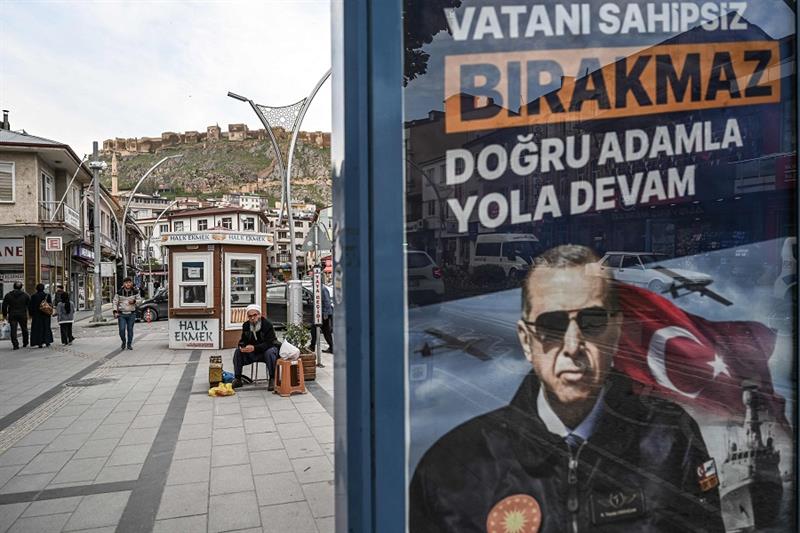
File photo: People sit next to a election banner of Turkish President at Bayburt city centre, north-east Turkey, on May 23, 2023. AFP
2002: rise of the AKP
Just a year after it is founded, the AKP scores a crushing victory in November 2002 polls.
The election ends years of political instability but sets off alarm bells in the secular establishment and the army.
Former Istanbul mayor Erdogan becomes prime minister in March 2003. Fellow AKP co-founder, former foreign minister Abdullah Gul, becomes president in 2007.
2005: EU accession talks
Ankara adopts a range of liberal policies -- including lifting a ban on Kurdish-language broadcasts and abolishing the death penalty -- that open the door to formal talks on joining the European Union in October 2005.
The process soon stalls, however, due to lukewarm support for Ankara's membership from key European powers such as France and Germany.
2013: anti-Erdogan protests
In May 2013 security forces crack down on demonstrators who rally against government plans to mow down a park near Istanbul's Taksim Square.
The repression sparks nationwide demonstrations against Erdogan but peters out after a month.
He is elected president in August 2014 with 52 percent of the vote, in the first presidential election held by universal suffrage.
2015: peace with Kurds collapses
In July 2015, a ceasefire between the state and the outlawed Kurdistan Workers' Party (PKK) collapses, reviving a separatist insurgency that has left more than 40,000 people dead since 1984.
The mainly Kurdish southeast sees months of heavy fighting.
Turkey is also the target of several attacks blamed on the Islamic State jihadist group based across the border in Syria.
2016: purges after failed coup
Renegade soldiers attempt a coup in July 2016 but it is swiftly crushed.
Tens of thousands are arrested and nearly 3,000 are sentenced to life in jail.
Erdogan blames the uprising on exiled US-based Muslim cleric Fethullah Gulen and his movement.
2018: super-presidency
In June 2018, Erdogan wins sweeping powers in a new presidential poll held after a referendum that dramatically boosted his powers.
His AKP also holds on to its majority in parliament but loses control of big cities, including Istanbul and Ankara.
2020: US sanctions
Ties with the United States are strained over Turkey's controversial purchase of a Russian air defence system.
After multiple threats, Washington suspends Ankara's involvement in the F-35 joint strike fighter programme and sanctions Turkey's defence sector.
2022: inflation crisis, Ukraine
Inflation soars to 85.5 percent in October 2022 and the lira loses half its value as the Turkish economy goes from boom to bust.
Erdogan is widely criticised for his handling of the crisis but wins praise for his response to the war in Ukraine.
Using his good relations with both Moscow and Kyiv, he tries but fails to negotiate a truce. But he does manage, with the United Nations, to convince Russia to end its blockade of Ukraine's Black Sea ports.
2023: devastating quake
On February 6, a 7.8-magnitude earthquake causes massive destruction in southeast Turkey, killing more than 50,000 people.
The slow response of the Turkish state and the continuing economic crisis leave Erdogan fighting for his political life in May 14 presidential and parliamentary elections.
But longtime opposition leader Kemal Kilicdaroglu trails him by almost five percentage points in the first round of voting.
Erdogan goes into the May 28 runoff as the favourite.
Short link: